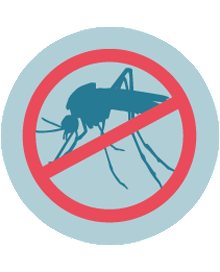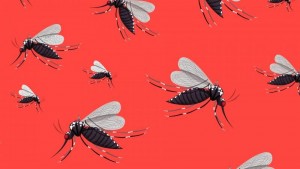
The Mystery of “Chik-V”
September 8th, 2018
It’s the time of year when we get a little more rain, after a long drought. It’s hurricane season too, so we may possibly get a great deal of rain – and with it, more breeding mosquitoes.
We should all know the routine by now. We should be extremely careful about storing water in and around the house, keeping it well covered at all times. We should make sure there are no hidden spots where water has collected (even some rain caught in a leaf can be home to baby mosquitoes). There is usually some fogging, at least in our neighborhood. However, it’s truly best to avoid chemicals altogether, for the sake of our own health and because they are generally harmful (especially to bees and other insects that are eaten by birds…) The fewer people I see wearing masks, with plastic containers on their backs and a spray in their hands, the happier I am.
Which brings me to the diseases that mosquitoes bring – specifically, the chikungunya virus. We called it “Chik-v” here in Jamaica. Now, according to the Jamaica Health and Lifestyle Survey released this week, 80.4 percent of Jamaicans had a positive blood test for Chik-V at the time. There were quite significant differences among the parishes, with an explosion in eastern Jamaica (Portland and St. Thomas). When it hit Kingston and St. Andrew, one could really say that the whole city was brought to its knees. Offices closed and events were canceled. The prevalence was over 90 percent – whereas in Manchester it was only 44.4 percent.
So, there is no cure and there are no vaccines available for this and other vector-borne diseases like the ever-present dengue fever. During a discussion on the radio yesterday evening, Dr. Winston Davidson pointed out that it has been around for decades, almost “off the radar,” with its origins in Tanzania, East Africa. A friend who has lived in Zanzibar for many years, however, says that, when “Chik-V” rampaged through their island, fingers were pointed across the Indian Ocean to India itself as the origin. In fact, some research has been done into the disease in that sub-continent, including Bangladesh. However, where are the results?
While we all know that most of us caught Chik-v and how miserable it was at the time – joint pains, fever, a rash and joint swelling for some (more women than men) – there is much still to be learned about Chik-v. In particular, how (and why) did it affect Jamaicans in different ways, on different parts of the island? Why did more women have certain symptoms? What about a possible link with depression? Which age group was particularly affected – and remains affected (and why)?
Most important of all, I would like to see some studies done on the long-term effects of the disease, which are not negligible. As Dr. Davidson told us, there is no “true picture” of the disease, from start to finish. Why do we get “flashbacks” of joint pain? Why do some people still find it hard at times walking up stairs, or opening a bottle of water? This week, I myself was laid low for a day by the pains, a swollen ankle, headache, and even a slight fever. From time to time, it just starts up again. However, I am told that it is not the virus itself that is still hiding inside us. It is the antibodies that we acquired when we first had the disease, which may remain in the body and somehow affect the soft tissues.
We need more. I hope that some serious research will take place at the University of the West Indies. I suspect that Chik-V is not a “one size fits all” disease and that health surveys in other countries may produce different results. We need to know what happened – and is still happening – in the Caribbean.
Because we don’t know what else may be around the corner. We need to keep on top of things and it’s already four years since the Chik-v outbreak. The world is changing fast.
Tags: aedes egypti, Caribbean, chikungunya, India, Jamaica Health and Lifestyle Survey, Kingston, Manchester, mosquito-borne disease, Portland, rainfall, Tanzania, University of the West Indies, Winston Davidson, Zanzibar
The Gleaner reserves the right not to publish comments that may be deemed libelous, derogatory or indecent.
To respond to The Gleaner please use the feedback form.
One Response to “The Mystery of “Chik-V””
- We Are the Zoomers
- Living Online with Humans and Birds: NAOC 2020
- Human Trafficking and the Problem of Public Education
- Down Memory Lane
- Are We Ready to Recover from COVID-19?
- Road Safety Matters: Is Your Vehicle Safe?
- Sexual Harassment, Me Too, and the Minister’s Disturbing Giggle
- The Vulnerable Senior Citizens, Private Care Homes and COVID-19
- A Muddle Over Masks
- Here is Something Life-Saving You Can Do: Give Blood!





[…] Health and Lifestyle Survey about the prevalence of the mosquito-borne disease four years ago. On the programme Dr. Davidson explained that it’s not the virus that has remained in our bodies, causing […]